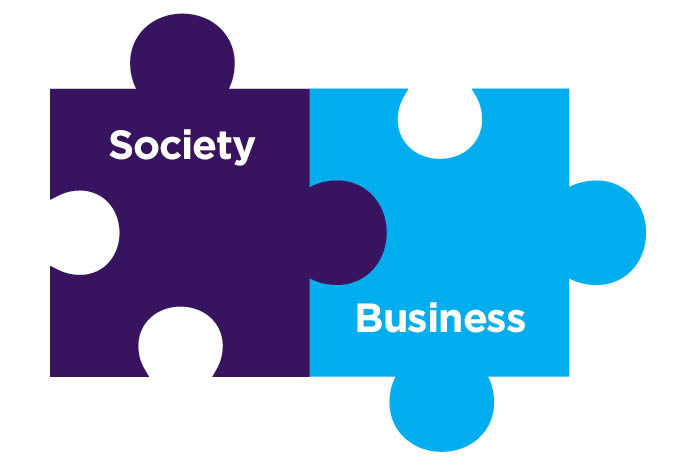
The Michael Best Strategies Business and Community Solutions team partners with industry leaders, forward-thinking innovators, and market disruptors to advance business goals in ways that protect the environment, improve people’s well-being, and strengthen communities. Sometimes referred to as “shared value,” these strategies create a sustainable framework, driving business growth while positioning our clients as socially responsible thought leaders and valued members of their communities.
What is a shared value strategy?
Bottom line: a shared value strategy is one where a private sector company uses its core business strategy – not philanthropy or corporate social responsibility – to have a positive impact on a societal problem. Sometimes shared value strategies improve people’s access to basic needs like food, housing, or clean water. Other strategies involve community investment and development. In other words, companies improve their own economic circumstances by improving conditions for others.
To paraphrase Adrian Gore, CEO of Discovery, an insurance company known for its innovative approach to promoting consumer engagement across its health and life insurance business lines under its Vitality brand:
“Shared value is not about how you spend the money you make – it’s about how you make your money.”
Who’s doing this?
Here are just a few examples of companies who have demonstrated success with shared value strategies.
Kroger works with suppliers to bring new, sustainable products to market (including a plastic milk jug that uses 10% less plastic than current designs). Kroger emphasizes sourcing from minority and women-owned businesses. These sourcing strategies recently won Kroger recognition on the Omni50, a list recognizing top corporate and government buyers using the economic impact of their sourcing activities to, in the words of the list sponsor, “gain market share by doing the right thing.”
The Gap has adopted a workforce training program that focuses on young adults from low and moderate-income backgrounds. Three-quarters of trainees in their This Way Ahead program received job offers at the end of their internships, and The Gap and other participating brands are reporting rates of retention and employee engagement that are twice those of other new hires.
Madison biotech firm Exact Sciences is partnering with the Urban League to create a pipeline of students from low/moderate incomes into high tech jobs. This approach builds a more diverse workforce for Exact Sciences, and creates opportunity for people who need it.
Denver-based MineWater is partnering with the City of Aurora, CO to turn polluted water trapped in decommissioned mines into a badly needed source of clean drinking water.
So, the better question is, are you in the dwindling pool of companies not pursuing shared value to unlock innovation, gain market share, and appeal to today’s workforce? How can your company stand out from the rest by taking on harder problems, at a bigger scale, with more partners? Michael Best Strategies can help you identify and execute those initiatives.
Your company might be a good shared value candidate if you want to:
- Address factors limiting business growth or profitability. The premise of shared value is that societal problems, whether related to the environment, human capital, or infrastructure, directly affect business and must be solved, in part, by a new kind of business engagement in social change.
- Create and fill new market space and serve new customers, or current customers in new ways. Many companies find that shared value strategies unlock innovation and foster business growth.
- Respond to customer and investor expectations. Public and private sector investors alike are demanding better performance, and greater accountability, on environmental and social impacts. Customers are more and more sensitive to sustainable and ethical sourcing and production. As Gen-Z and Millennials age, these sensitivities will only amplify.
- Attract and retain a talented workforce. Currently the largest workforce segment, Millennials care about a company’s purpose as much as they care about its profits. Every business we work with, in every industry segment, is challenged to find and keep the best workers. Shared value strategies will help you stand out.
How can Michael Best Strategies help find your path?
Michael Best Strategies works with clients across industries to develop and implement shared value strategies in environmental sustainability, workforce development, and community engagement, particularly where those strategies intersect with government in some way. Companies who lead with their shared value strategies can create economic value for themselves and shape their industries by working with regulators to ensure that their forward-thinking approaches are rewarded not just by consumers and the overall marketplace, but by the government sector as well.





